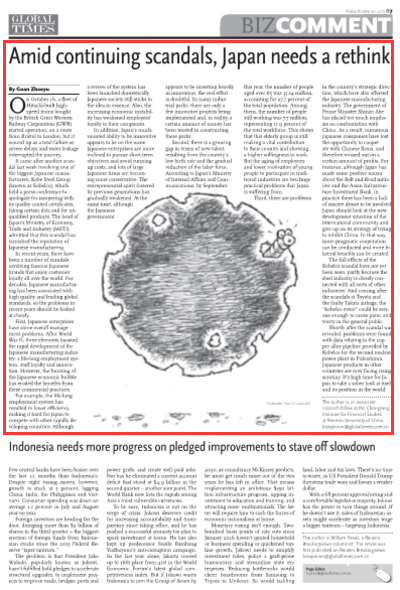Major Power Relations
Your Present Location: PROGRAMS> Major Power RelationsGuan Zhaoyu: Amid continuing scandals, Japan needs a rethink
By Guan Zhaoyu Source: Global Times Published: 2017-10-19
On October 16, a fleet of Hitachi-built high-speed trains bought by the British Great Western Railway Corporation (GWR) started operation, on a route from Bristol to London, but it wound up as a total failure as severe delays and water leakage interrupted the journey.
It came after another scandal last week involving one of the biggest Japanese manufacturers, Kobe Steel Group (known as Kobelco), which held a press conference to apologize for tampering with its quality control certificates, faking certain data and for unqualified products. The head of Japan`s Ministry of Economy, Trade and Industry (METI) admitted that this scandal has tarnished the reputation of Japanese manufacturing.

In recent years, there have been a number of scandals involving famous Japanese brands that enjoy customer loyalty all over the world. For decades, Japanese manufacturing has been associated with high quality and leading global standards, so the problems in recent years should be looked at closely.
First, Japanese enterprises have some overall management problems. After World War II, three elements boosted the rapid development of the Japanese manufacturing industry: a life-long employment system, staff loyalty and innovation. However, the bursting of the Japanese economic bubble has eroded the benefits from these commercial practices.
For example, the life-long employment system has resulted in lower efficiency, making it hard for Japan to compete with other rapidly developing countries. Although a review of the system has been launched domestically, Japanese society still sticks to the idea in essence. Also, the increasing economic instability has weakened employees` loyalty to their companies.
In addition, Japan`s much-vaunted ability to be innovative appears to be on the wane. Japanese enterprises are more inclined to pursue short-term objectives and avoid running up costs, and lots of large Japanese firms are becoming more conservative. The entrepreneurial spirit fostered by previous generations has gradually weakened. At the same time, although the Japanese government appears to be investing heavily in innovation, the real effect is doubtful. In many industrial parks, there are only a few innovative projects being implemented and, in reality, a certain amount of money has been wasted in constructing these parks.
Second, there is a growing gap in terms of new talent, resulting from the country`s low birth rate and the gradual reduction of the labor force. According to Japan`s Ministry of Internal Affairs and Communications, by September this year, the number of people aged over 65 was 35.14 million, accounting for 27.7 percent of the total population. Among them, the number of people still working was 7.7 million, representing 11.9 percent of the total workforce. This shows that this elderly group is still making a vital contribution to their country and showing a higher willingness to work. But the aging of employees and lower motivation of young people to participate in traditional industries are two huge practical problems that Japan is suffering from.
Third, there are problems in the country`s strategic direction, which have also affected the Japanese manufacturing industry. The government of Prime Minister Shinzo Abe has placed too much emphasis on confrontation with China. As a result, numerous Japanese companies have lost the opportunity to cooperate with Chinese firms, and therefore missed out on a certain amount of profits. For instance, although Japan has made some positive noises about the Belt and Road initiative and the Asian Infrastructure Investment Bank, in practice there has been a lack of sincere desire to be involved. Japan should look at the new development situation of the international community and give up on its strategy of trying to inhibit China. In that way, more pragmatic cooperation can be conducted and more bilateral benefits can be created.
The full effects of the Kobelco scandal have not yet been seen, partly because the steel industry is closely connected with all sorts of other industries. And coming after the scandals at Toyota and the faulty Takata airbags, the "Kobelco event" could be serious enough to cause panic and worry in the general public.
Shortly after the scandal was revealed, problems were found with data relating to the copper alloy pipeline provided by Kobelco for the second nuclear power plant in Fukushima. Japanese products in other countries are now facing rising scrutiny. It`s high time for Japan to take a sober look at itself and its position in the world.
The author is an associate research fellow at the Chongyang Institute for Financial Studies at Renmin University of China.
Key Words: Japan; Scandal; Rethink; Guan Zhaoyu























































































 京公网安备 11010802037854号
京公网安备 11010802037854号





